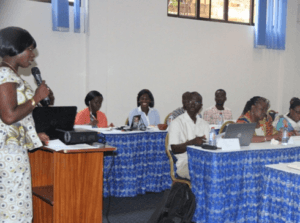National dialogue on land opens
 Ms Barbara Serwaa Asamoah, the Deputy Minister of Lands and Natural Resources, has urged chiefs to avoid outright sale of lands to investors and instead use it as equity to benefit better from such partnerships.
Ms Barbara Serwaa Asamoah, the Deputy Minister of Lands and Natural Resources, has urged chiefs to avoid outright sale of lands to investors and instead use it as equity to benefit better from such partnerships.
“If you sell land outright, you have no control of what they use it for, but when you do equity sales you can have a say in ensuring that the land is used for its intended purposes and you will continue to benefit from the land,” she said.
Speaking at a National Policy Dialogue in Accra on Monday, Ms Asamoah said equity sale of land would also do away with “land speculators” who bought land under the guise of using it for a good purpose and later resold it at much higher price.
The two-day dialogue, organised by the Network for Women’s Rights in Ghana (NETRIGHT), in collaboration with the International Institute for Environment and Development, is to enhance advocacy in equity to effect gender transformation in land governance legislations, systems and structures at the community, district, regional and national levels.
The theme for the dialogue is: “Enhancing Women’s Voice and Presentation in Land Governance in Ghana”.
Ms Asamoah said the issue of land accessibility to women in the country was critical and that although in most parts of Ghana, women were custodians of lands, they were not allowed to own the land or register them in their names.
“We need to positively discriminate for women to access and own land so they can use land for collateral and for farming and building purposes,” she said.
She said government introduced the Land Administration Project (LAP) in 2003 to provide an efficient land administration management system that was fair, efficient, transparent, decentralised and sustainable to both men and women.
Ms Asamoah said government considered LAP as a major catalyst to improving tenure security, poverty reduction and sustainable development as it continued to seek partnership from all stakeholders to enhance women’s voice and representation in land governance in Ghana.
She said women’s land rights were fundamental to ensuring women’s economic empowerment and sustainable livelihoods which could lead to improve their economic participation and status in society, improved nutrition and food security, and access to credit and education for their children among other things.
Ms Asamoah said government, therefore, designed LAP 1 and 2 and took steps to map gender dimensions of land administration and commissioned a gender mainstreaming strategy under the project to cater for gender under-representation.
She gave the assurance of government’s determination to work with civil society to strengthen women’s voice and participation in land governance.
Ms Pauline Vande Pallen, the Convenor of NETRIGHT, said the policy dialogue formed part of activities of a project known as; “Strengthening rural women’s livelihood opportunities through empowerment in community and land stewardship and accountability in agricultural investments in East and West Africa,” supported by the International Institute for Environment and Development.
She said the International Institute for Environment and Development was sponsoring four African countries namely; Ghana, Senegal, Kenya and Tanzania to work on issues of control over decision making in the governance of land and agricultural investments at the household, community or national levels from a gender perspective.
She said Ghana’s project explored processes, initiatives and intervention that strengthened women’s voice, empowerment and accountability. It also analysed how such initiatives or their outcomes might be linked to policy processes to facilitate wider shifts and address implementation gaps in land and investment governance.
The dialogue, therefore, seeks to build consensus among key stakeholders on the most effective strategies to promote gender equitable land governance in the country.
Source: GNA
